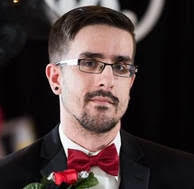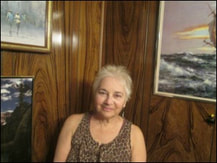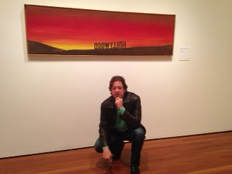 Rhonda Zimlich is a writer of fiction, poetry, and occasional memoir. Her work has appeared in publications such as Brevity, Acorn Review, and Ink Stains Anthology. She lives in the Pacific Northwest with her husband, twin daughters, a shaggy rescue dog, and two feisty black cats. Her MFA in writing is expected summer 2018. Follow her on Twitter here: @RhondaZimlich and learn more about her work here: www.rhondazimlich.com The Flat of Her Back Sinclair Clay loved his mother, but he did not love living with her. He’d moved her into his apartment just after her Alzheimer’s diagnosis last year. Since then, her state seemed to deteriorate. It was fine that she put the eggs in the cupboard or the laundry in the garbage compactor, but a few months earlier, she had let Sinclair’s dog, Rufus, out the front door of the apartment and Rufus did not return and was not found later at the dog pound. But the worst of all—and Sinclair hated that he regarded this as the worst part of it—was that his mother often thought of him as a child, sometimes as young as 12 years old, and she would make a great fuss over him. Sinclair had looked into a few residential memory care facilities, but they were cold and sterile. Even the one he’d visited just up the street, Sunnyvale, seemed strange and custodial and not the vale of sun its name suggested.
Still, it seemed like it was just a matter of time before she hurt herself, or wandered out the door when he wasn’t home, or on the phone, or running on his treadmill. He’d taken to running at the apartment rather than going out through the neighborhood for his exercise. He’d also been working at home more often, neglecting the necessary time with his staff to keep morale up and a smooth workflow in his office. Still, Sinclair could not find the courage to move her into the sterile world of the Sunnyvale Residential Memory Care Apartments. Despite the brightly colored brochure on his nightstand which boasted that she could still “enjoy a vibrant life with stimulating activities,” Sinclair trusted only himself to care for her daily living arrangements. For the time being, she would simply have to stay put. One day, as Sinclair went over his notes for a new business contact in the Gobi, he heard his mother making a loud racket in his kitchen. “What’s all this?” he asked as he came to investigate. Opened jars and packages of deli meat and plastic-wrapped cheese were strewn about the counters. A roll of paper towels lay unspooled across the stovetop spilling a ribbon of Bounty into the dining room. Three knives were scattered on the tile floor, evidence of the clatter he’d heard. “I’m making your lunch,” she said, without looking up at him. Her hands were occupied with the task of spreading mustard onto wheat bread. She was dressed in a housecoat, the kind women wore in the 1960s, that hung to her knees in long pleats from small gathers just below her shoulder-heads. Large, floral print made the housecoat, and his mom’s tiny body, seem comically big, disproportionate to her head, which seemed small, crowned with her golden-rimmed glasses she’d perched on the top of her shaggy gray hair. She pulled the glasses down to her eyes smearing one of the lenses with a thin fingerprint of yellow mustard. Sinclair looked at the clock. It was nearly four-thirty in the afternoon. “I’m working from home tonight, Mom.” He tried to emphasize the time of day. “Home?” She looked at him with glistening eyes, obscured behind the shine of her large spectacles and yellow smear. “Oh, goodness no. You are so silly.” She laughed. Then she set about layering cheese and meat onto the bread. Sinclair could not know what was happening in her thoughts and it pained him to recognize a vacancy in her demeanor. “I’m not being silly mom. I am working from home this entire evening. My client is in the Gobi desert and I need to Skype with him once the sun comes up in Kumul.” Hearing this, Sinclair’s mother shook her head and creased her brow. “It’s a very important call, Mom.” And it was, too. Sinclair was making arrangements to travel to China to meet his overseas partners and finalize the race route he’d been planning. He had worked hard on this project. Going to China was a dream he and his staff had shared from the onset of his company; it was finally happening! Yet the thought of leaving his mother in the care of a nurse made him feel very anxious. He also knew he could not take her with him this time, certainly not like before. He’d even thought about bringing his mother along with a nurse as well. And there was the Sunnyvale option, of course. But any of that would have to be decided at another time. Right now, he had to prepare for his important call. “It is indeed—a very important day. It’s not every day that a mother’s young man starts middle school. Now go get yourself dressed.” Sinclair looked down at his polo shirt and Dockers and flinched with exasperation. He felt angry at her for being so stupid. Then he felt angry at himself for being angry at her. He started winding the paper towels back onto their cardboard spool. “I am dressed, Mom,” he said and he set the rumpled paper towels on the countertop and stared blankly at her. She stepped over to him at once, and in a swift gesture, licking the entire palm of her hand as she came toward him, she reached up and smoothed his cowlick with her wetted palm smashing down the hair that jutted up to the left from his forehead. They locked eyes for a moment. Hers were soft and round beyond the lenses of her glasses, filled with hope and love and care. In that moment, Sinclair almost wished he was really off to middle school, to discover for himself the reason for the optimism that loitered in her gaze. But, no. “Mom, I’m 32 years old.” He pushed her hand away. “I work for a company . . . I own a company that organizes extreme races around the world.” He felt like he was introducing himself at a conference. “Last year I took you to the Andes? Remember the giant mountains? The ruins of the Inca?” He regretted his tone at once, thinking about how the neurologist had cautioned him to curb his frustrations, find other outlets for his exasperations, especially because his negative reactions might be frightening to his mother unaware that she even experiences symptoms. She looked helplessly at him, confusion unseating her optimistic expression. The clock clicked ever noisily with a tick, tick, tick, and Sinclair observed how loud it was for the first time. He studied his mother’s wide and wondering eyes. Golden streaks emitted from the hazel of her irises, the frames of her glasses surrounded her eyes and echoed their gold tone, making strange halos around her gaze. Sinclair thought she had lovely and clever eyes then, but distant, like they were looking back at him from far away. He became aware that he held his breath in and he let it out. “Your social studies reports are going to be even better this year; I can tell,” she finally said, resurrecting her smile and breaking the silence. Sinclair let out a weighty huff. “Mom, I’m not 12. I’m 32.” “Not yet, you’re not.” She licked the tip of her thumb then wiped it down his cheek as if removing a smudge of dirt that he almost believed was real. She winked at him and then moved back to the task of layering the bread atop the sandwich before picking up one of the knives from the floor and using it to trim the crusts. He returned to his office and locked the door. Sinclair stayed away for the rest of the night, privately secure in his solitude. He did not return for the sandwich. The next morning after his shower, Sinclair stood at his bathroom mirror shaving wrapped in a towel at the waist and humming to himself. Suddenly, his mother peered into the bathroom doorway, tilting her head sideways past the doorjamb and moving slowly like a sly cat. He saw her there only after her glasses caught the reflection of the vanity lights and the vision of her partially obscured face staring in at him gave him a start. He wondered how long she’d been there and the thought gave him an odd feeling. Through the reflection, his eyes went to the vacant robe hook next to the shower door. “It’s your birthday,” she announced. “Happy birthday, my big boy.” Her own playful laughter accompanied her as she came fully into the bathroom and put her arms around her grown son, holding him tight from behind. Sinclair stood six-foot-even, about half a foot taller than his mom, and the embrace was ill-fit. In the reflection, he saw only her arms wrapped around his bare torso and a tuft of her gray hair angled out from beneath his raised right arm, which still held the razor hovering in midair, suspended in the surprise of her arrival and actions. He could feel her breath on his back and he wanted to shake her away. Half of his face was cleared of shaving cream and stubble. He noticed in the reflection that he wasn’t smiling—but rather gaping with such incredulity that he might offend her—and so he forced a smiled hoping the situation’s awkwardness would improve. “Thanks Mom.” He stood straighter, trying out his patience for the first time that day. “How old am I today?” “Oh, 12, you silly moose.” She unwrapped her arms from her son and bent to pick up his laundry. “12, you say? You sure?” “Of course I’m sure. I remember the day you were born like it was yesterday. Your father . . .” “Dad? What about Dad?” She continued to gather socks and small items from the floor as she spoke. “Everything’s set. It’s all just so. We’ll have cake when your dad gets home. I want this to be the best birthday ever.” “Mom, what if I told you that I am really 32, and that it’s not my birthday at all? That it’s just another regular Tuesday?” Sinclair’s mother stood with a small armful of damp towels and clothes. She was grinning at him and her glasses had begun to fog with the moisture and heat of the bathroom, two opaque screens clouded over in a pause. She shook her head, then turned to leave. “Mom, I’m serious.” Sinclair followed her through the bedroom, but she kept moving, the flat of her back and blank shoulders telling him that he should not push the issue today. He followed her all the way through the apartment until they reached the closet with the laundry chute. She did not turn to face him. “I thought I might come down to your school today and get on the volunteer roster,” she said as she dropped the items down the chute one by one. “There is no school today, mom,” Sinclair declared flatly, crossing his arms over his bare chest. He felt vulnerable, exposed. She turned toward him and her gazed traveled across the half of his face that was still covered in shaving cream. “There’s no school, mom. Not today or anymore.” “I know. You’re all grown up now.” “You do?” His head snapped back in surprise. “Sure I do. I see what’s going on here.” She winked at him. “You want me to drop you off down the street so your friends don’t see you. I can do that.” “Mom, I don’t go to school anymore. I graduated from business school at USF five years ago, remember?” She didn’t seem to hear him. “I’ll drop you off by the 7-11 and then I can pick you up at that same spot later. No one will know except us.” “You haven’t driven in nearly ten years,” Sinclair sneered, sounding angry and impatient. “Why are you mad at me? I am just trying to help.” He could see tears form in her eyes and her forehead began to crease with worry. “I’m not mad, Mom.” He reached out and gently placed his hand on her shoulder. She lowered her head and looked at the ground. “I did it again, didn’t I?” “You haven’t done anything wrong.” She lifted her head and pushed the bridge of her glasses up on her nose giving Sinclair the illusion that her eyes grew larger in that instant. He could see pale flecks then of emerald surrounded by thin ribbons of gilt-edged hazel woven in her irises—such deep, intelligent eyes. How could he turn her over to total strangers? She had been a math teacher in high school, a hospital volunteer. She even coached his soccer team one season when he was nine and she was great at it. He could see her inside her eyes, as clear as ever. “Okay, good,” she said, breaking his trance. “Then go get dressed. We’re leaving in 15 minutes. You don’t want to be late for your first day.” What was Sinclair to do? Should he go along with his mother, dress as a seventh-grader, maybe insist that they walk to some local school yard and then fake ill so that he wouldn’t have to go to school? That could work. He could spend the day with her making him soup and grilled cheese, watching cartoons with him and reading him full chapters of Hardy Boys. Would it be an act of love if he carried on with this charade? Or would he be merely postponing the inevitable? But was postponing the inevitable so bad when the outcome was set to be as terrible as he could imagine—for him at least; she wouldn’t know. Or would she? She was his only blood relative; no aunts or uncles to call upon or distant cousins to check in with on the hereditary characteristics of this disease. And when she was gone, it would be just him. Ultimately, he decided to ignore her and avoid her for the rest of the day, but he worked from home that day just in case she needed him near. That night, she came to him in his office, two mugs of hot tea in her hands. She handed him a cup, a steaming red mug; a paper tag hung from a string dangling over its edge. “I’m afraid, Sinclair,” she said. She squatted down and sat on the footstool by his bed. “Me too, Mom,” he answered, closing his laptop. He had been reading again about the Sunnyvale Residential Memory Care Apartments and mapping the distance to it, not more than twelve blocks from his apartment. “I know why you were mad earlier,” she said. “You do?” he asked, his eyes filling with tears at his own realization that he did not have to try to figure out if this was really her talking, if she was really present just then. “Son,” she started. “You father and I used to talk about never wanting to be a burden on you. He loved you so much, you know?” “I know.” “When the doctors first told us about his cancer, we didn’t want to tell you. Did you know that?” Sinclair nodded his head and blinked back tears. She had told him the story before but he could hear it again. He could hear it a million times if it meant his mom was lucid, clearly recalling such tender details of their lives with accuracy and fluency. “We walked through the park that day, no fog over the bridge, and he was joking about the Golden Gate not being golden at all.” “It’s red,” they both said in unison, and Sinclair laughed a small chuckle that almost stifled his crying. Instead, it came out as a choked guffaw and he felt embarrassed, like a young boy. “Well, he said we shouldn’t tell you,” she whispered and she shook her head when she said it like she meant to say the word “no” out loud, but couldn’t. She couldn’t respond to a man that was dead, a man she loved, a man she only remembered now in brief moments of clarity. “He said he would go away on some trip and he intended to go, too. He would rather have died all by himself than to make either of us suffer with him.” “I know.” “In the end, it was me. I convinced him to tell you. You were so young. Just barely in high school. And the fact that your dad was an orphan and my parents were both already gone, that left just us to help him, to help each other. I needed you to know, son. I needed you to know, Sinclair. You know?” Tears had gathered along her lower lashes and her eyes glistened at him. “I do know.” Sinclair swallowed hard after he said these words. He had yet to sip his tea, but felt the warmth of the mug moving through his palm and fingers. He stared at the circle of the mug’s rim, noticed the tiny string that hung over the edge dangling a paper tag. He fingered the tag and read the offering of the name on one side “Yogi” and the saying “All knowledge is within you” on its flip-side. “What’s your tea tag say, Mom?” “My what?” she looked confused. “Your tag. There.” “Oh,” and she grinned as she gathered it. “It says ‘say it straight, simple, and with a smile.’ That’s nice.” And of course, she smiled at him then. “Mom,” Sinclair leaned toward her. “Do you remember what it’s when you think I’m . . . I mean, do you remember us talking earlier about me being in middle school?” His mother’s radiant smile slowly faded. The tea tag fell from her fingers. “Yes. Now I do. A little.” Her voice was so small then. “It’s okay.” “I don’t think you should be burdened with this disease of mine. What if I really do try to drive?” “You won’t,” he said, and she looked at him skeptically. “Well, you can’t. I’ve hidden the keys.” “Or worse?” she asked with some finality to her tone. “Worse?” “You know. Worse.” As she said the word again, Sinclair felt a tug in his gut as if something were pulling him from the inside out. For a long moment, they stared at each other. Sinclair thought about how he could see her in there, clear and lucid, through the lenses of her glasses, deep in the pools of her eyes; and they were unfathomably deep. “I have been looking into a place that can help,” Sinclair said, deciding to break the silence. “A place? What kind of place?” “Well,” he took in a big breath. “There’s a place not far from here that has . . . memory care and a staff of doctors and nurses. They focus on neurology and they can help. The doctors and the nurses, they aren’t residents but the patients are. They—” “Residents? I would live there?” “Well, yes, Mom. You would live there. But it’s just up the way. I can actually walk there in about 15 minutes.” He rubbed his thumb along the top of the mug’s handle, looking into the deep amber of the cooling tea. “Well, I guess I didn’t realize how difficult it had become,” she said, her words sounding inflicted, resentful even. “And here I thought I was actually being helpful.” “You are helpful, Mom. Please don’t take it that way.” “I’m not sure how else I should take it, with you making plans for me to go off and live somewhere like a . . . a . . . kept woman!” Her voice bayed. “It’s not like that, Mom. I’ve just been worried. I’ve been scared too.” Sinclair’s eyes burned with tears and his throat cinched shut stifling a whimper. “I’m not sure . . . when you know and when you don’t know, or when you remember and when you forget. How long before you aren’t even sure where you are and you wander out of here? What then? I can’t always be here. I’ll have to fly to China soon. What then?” His mom didn’t answer him. She just looked at him with a stunned expression, her eyes wide behind the glare on her lenses. Sinclair moved flat fingers to his cheeks and pressed the streaks of tears away from his face. His mother also reached out and touched his face, her stunned expression fixed. He grabbed her hand and squeezed it with a small, desperate grasp. Then, she stood and reached out for his undrunk cup of tea. Looking up at her, he handed her the mug. “It’s time for bed. It’s a school night.” Her tone was flat, her gaze distant. She turned her back on him and left the room. That night as he slept, Sinclair dreamed of the Sunnyvale Residential Memory Care Apartments. Painted on the wall of the facility was a saying by Mark Twain: “If you tell the truth, you don’t have to remember anything.” Sinclair knew the saying from his college fraternity but wondered why it was appropriate for such a facility. He didn’t ask. He only wanted to find his mother. Beyond the entryway, a group of workers in long, white coats busied themselves with clipboards and boxes, checking boxes on the clipboards and stacking boxes on the floor. They had no faces, but instead blank slates of flat flesh in colors of tan, peach, brown. Though he found their featureless heads odd, he wondered mostly about their lack of eyes. They seemed to see where they were going and what they were doing, but they had no eyes to lead them through their task. He moved from person to person asking where he could find his mother but the blank slates could not respond, having no mouths from which to speak. Instead they gestured with their hands in a mannequin fashion, barely animatronic. In his panic, he started to run, and before long discovered he was running in one of the extreme running competitions that his company organized, except this one was not set in some dangerous desert or along the steep escarpment of towering mountains. Instead, he was running in place in a plain and mundane landscape, but he was running as fast as he could run, trying to catch up to his mother’s flat back and blank shoulders. He awoke to cold sweat and the sound of the smoke alarm. Panic bounced him out of bed and he flashed down the hall, the piercing sound reverberating off the walls and through the apartment. It came from the kitchen! Smoke! He noticed there was actual smoke so it couldn’t just be some malfunction of the alarm. His senses were on high alert as he rounded into the kitchen and saw the outline of his mother’s back. She was fanning smoke away from the oven by waving a large frying pan back and forth in the air. “Mom!” he yelled, and grabbed her to pull her away from the oven. She screamed and hit him in the head with the pan. Sinclair saw stars before he fell to the floor and the world went black. When he came to, the fire department had just entered the apartment and his mom was sitting in the living room crying with a neighbor, Mr. Lee. He found out later that Mr. Lee had heard the commotion and called 911 before coming over and banging on the door. They were lucky that his mother had sense enough to open the door and let Mr. Lee in. He brought with him a fire extinguisher and he put out the burning loaf of bread that smoked in the oven. “I forgot the bread was rising,” Sinclair’s mother explained to the firefighters as the paramedics examined and bandaged the gash on Sinclair’s forehead. “I always give the bread a second proof but I just forgot when I set the oven to preheat, which I do at a higher temperature to crust the bread proper, you see.” She looked at Sinclair as if he might help explain the steps to her bread making. Instead, he openly wept, sobbing in loud, guttural gasps and heaves. In the end, the fire department did not charge him for the call. A week later, so much had happened. Sinclair had moved his mother into the Sunnyvale Residential Memory Care Apartments and she even seemed to like it. She was under the care of a new neurologist who specialized in the treatment of Alzheimer’s and he had put her on a new medication which gave her longer periods free from the symptoms of her disease. As a result, she’d been lucid for much of the time she had already been in the memory care facility. This actually gave Sinclair pause. He questioned his motives for wanting to admit her before his upcoming trip to China, but his mother seemed to get along with the other women there in her apartment wing, and the care workers were attentive and compassionate, so he told himself it was okay. As Sinclair walked into the courtyard of Sunnyvale, he spotted his mother across the patio sitting with her new friends. He approached her and set down a loaf of fresh baked bread on the table in front of her. “I picked this up at the bakery,” he smiled at her. She looked at him over the rim of her glasses and for a second, she seemed to glower. But the moment passed and then she was warm like sunshine. “Oh, ladies,” she beamed. “This is my son, Sinclair.” She had introduced him before. The women nodded at him just as they had before. She continued, “Sinclair makes ultra-marathons. Do you gals know what that is?” “Mom, not everyone cares about that sort of thing,” Sinclair said. He noticed how lucid she seemed and the pang of regret he felt surfaced and lingered. “Nonsense. It’s important,” she said, pushing up her glasses as she looked at him. Kind creases accented the corners of her eyes. “Sinclair makes one hundred miles races in the desert.” “Who would drive a hundred miles into a desert?” asked one of the ladies in a salty, cracked voice. “Not drive, Carol. Run,” Sinclair’s mom said, and she fired an air pistol with her finger on the word ‘run.’ Then they all started laughing as if such a thing were the funniest thing they had ever heard. Even Sinclair’s mother laughed. Even Sinclair laughed to see such a thing, a group of women carrying on about something that really wasn’t very funny. “Well, go on then,” said the woman named Carol as she pulled out a chair for Sinclair to sit. “Tell us about your hundred mile running races in the desert.” Sinclair sat and they talked for a long time into to the afternoon. He and his mother shared long glances, some of which were warm and forgiving, but there were times when Sinclair would detect a hint of anger as her brow furrowed at him, narrowing her eyes. When it came time for him to say goodbye, she walked him to the gate. “You’re just going to leave me here like a caged animal, I suppose,” she pouted. “You seemed to be enjoying yourself” “Sure, I like the Jell-O. It’s got more flavor than the company,” she said, casting a look back toward Milly and the group of women in the courtyard. “Listen Mom, if I thought there was any other way—” “No, you’re right. I nearly burned down your apartment.” She sighed. “You can put me in here, but you can’t make me like it.” She squinted knowingly at him. “You’re right.” Sinclair’s mom reached up and touched his cheek softly with her fingertips. Her eyes were full of concern toward him. “Be good,” she said and she turned away, leaving him standing at the gate watching her the flat of her back swish slowly as she sauntered across the courtyard to return to the women at the table. Then, Sinclair turned to the guard at the gate and gave a wave. The buzzer sounded and he pulled the gate open. Once outside, he bent low to tighten the laces of his Nikes. Then he stood, took in a deep breath, and finally sprinted off down the sidewalk starting out on what he hoped would be a long and satisfying run.
0 Comments
Cassidy Street is a librarian's assistant from Falkner, MS. His fiction has appeared in Five on the Fifth and Indigo Lit. He is also the 2015 winner of the Kirk Creative Writing Award sponsored by Blue Mountain College. Greenhouse Three |
Categories
All
|






 RSS Feed
RSS Feed